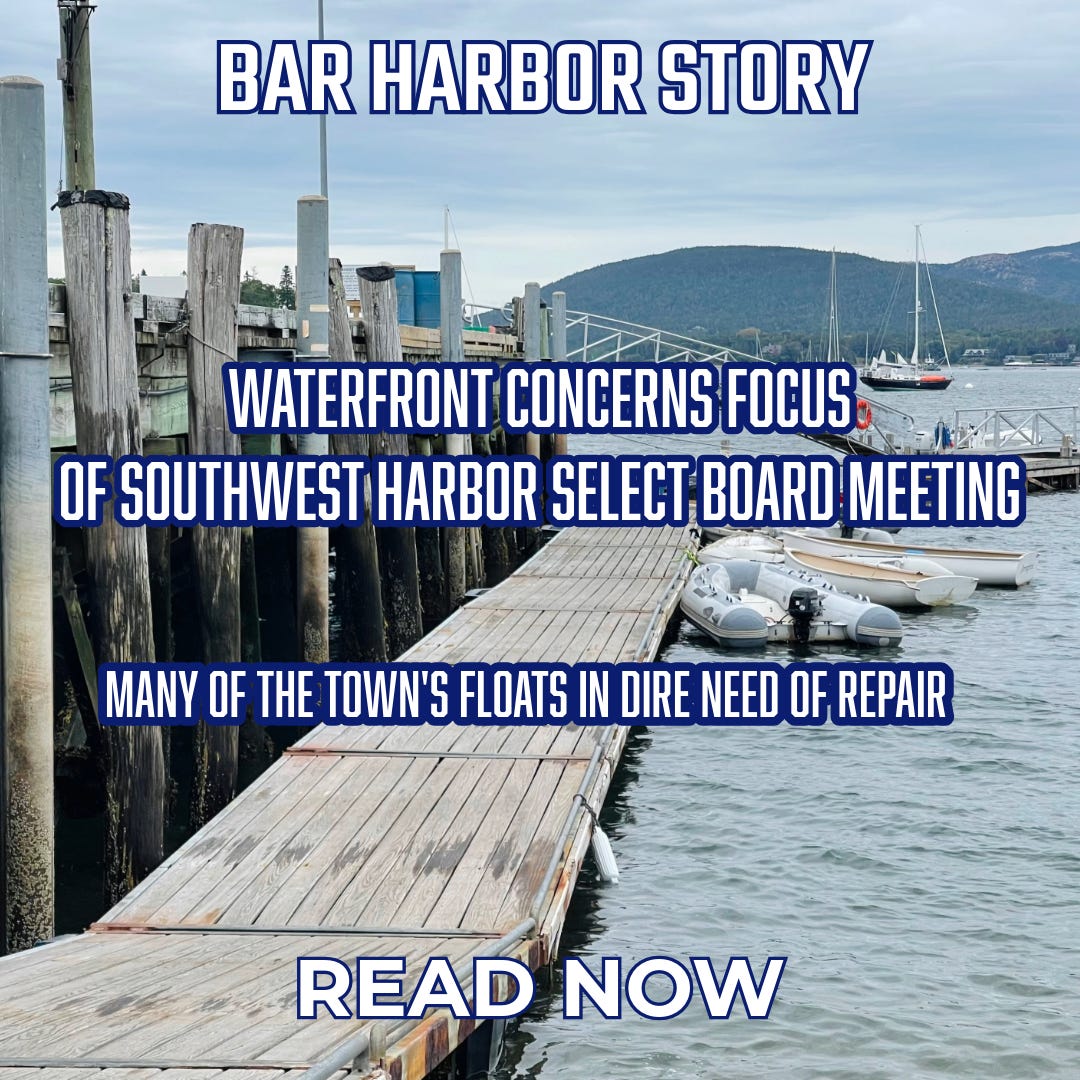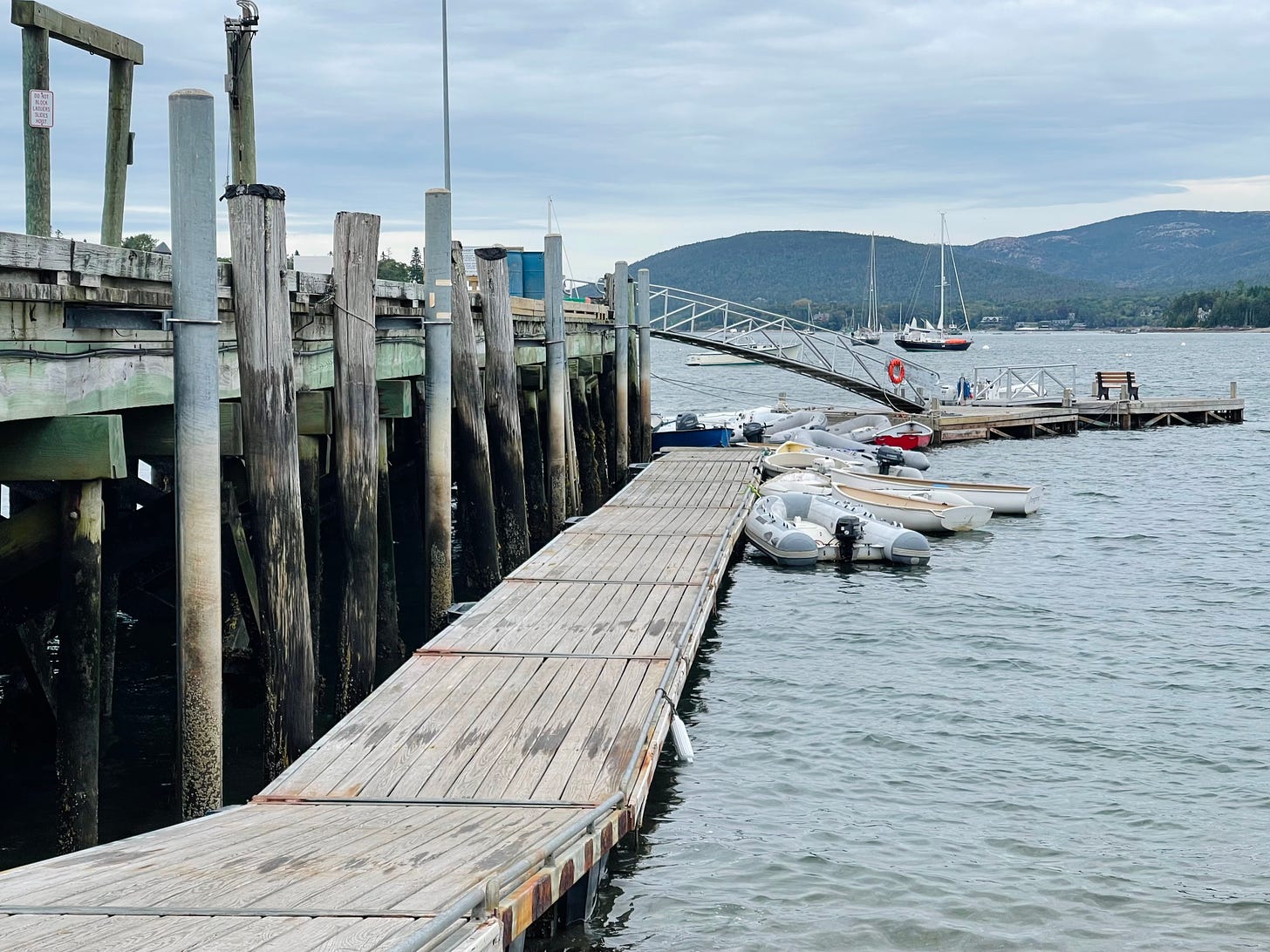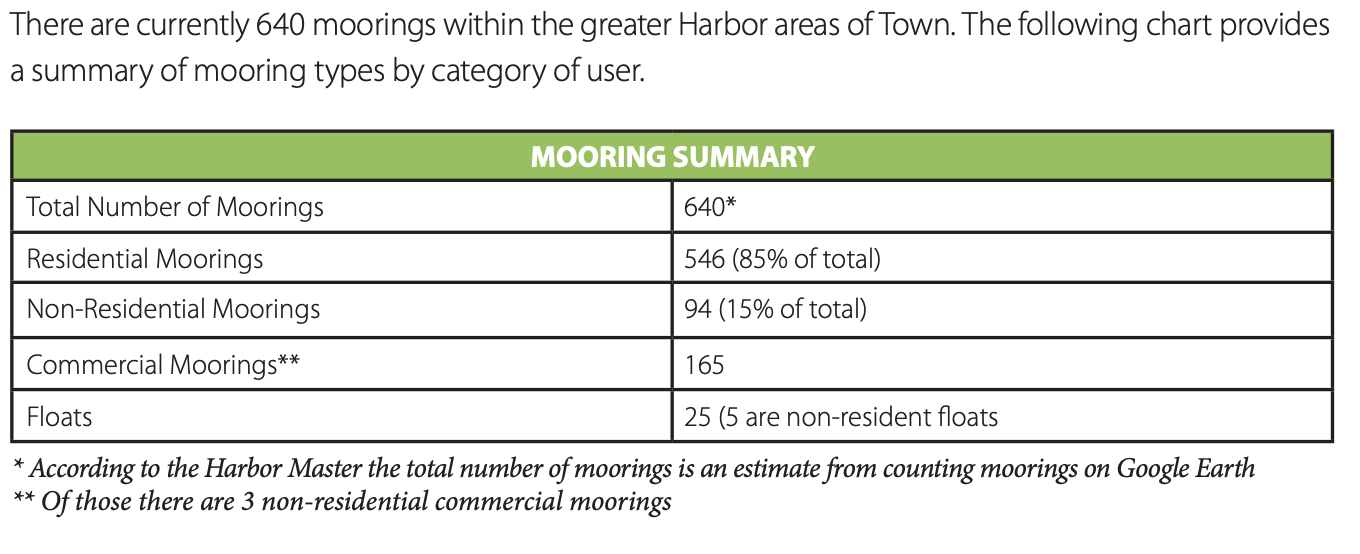Waterfront Concerns Focus of Southwest Harbor Select Board Meeting
Many of the town's floats in dire need of repair
The Bar Harbor Story is generously sponsored by First National Bank.
SOUTHWEST HARBOR—Harbormaster Rob Leavitt told Southwest Harbor Select Board members, Monday night, that the lower town floats are in “dire need” of repair.
“We’ve got an immediate need for repairs and there’s a potential condemning of many of our floats,” he said.
An appointment, clam licenses, questions about the state of Southwest Harbor’s resources, and a MaineDOT Small Harbor Improvement Program (SHIP) grant dominated the Southwest Harbor Select Board’s meeting. That grant would help the town pay for repairs to its floats, essential to its working waterfront.
Based upon the amount of funding applied for via that SHIP grant, if approved, it is projected to take 1-3 years, he said, before the money is received from the state.
“All the rest are hanging in there,” Leavitt said of the floats. “I’m going to try to get us through to next year with what we have, which is going to be a challenge.”
The floats all need to come out of the water, be inspected, and a game plan created for how to deal with them. If the grant is approved, it would be $100,000 from the state, which requires a $100,000 match from the town.
Leavitt said he imagines a two-stage process and believes it costs $150,000 to replace the first series of floats. These are the ones that need to be condemned, he said. The second series would cost a slightly smaller amount, he said.
“The recommended maintenance schedule of floating piers involves annual removal from the water for drying out the wood to inhibit degradation and destructive growth,” Town Manager Karen Reddersen said in her manager’s memo. “Historically Southwest Harbor rotated floats according to the Harbor Management Plan, but for approximately ten years, proper rotation has not occurred.”
That shortened the lifespan of the town’s floats.
“The replacement of floats for the harbor is a priority for safety reasons and commercial fisheries support,” she wrote. “The goals of the SHIP Grant support working waterfront communities and are designed to improve economic activity, infrastructure and access.”
The upper town dock, the lower town dock, and the Manset town dock are the town’s three main waterfront facilities in its inner harbor. There are approximately 640 moorings and 25 floats.
Select Board member James Vallette suggested having a capital improvement project line for the floats. Leavitt said he applied after reading in the Bar Harbor Story about how Bar Harbor Harbormaster Christopher Wharff had written that Bar Harbor’s new finger floats, created at Seawood Services in Southwest Harbor were set to arrive in November and will be launched in the spring.
“They have turned out really nice and are much needed as the old floats are in really bad shape. This project was funded by a MaineDOT SHIP grant with 50% match from the town,” Wharff wrote.
According to a report prepared by the Musson Group, “Commercial fishing has historically been one of the main activities in Southwest Harbor. Today there are approximately 60 commercial fishermen. Most are involved in the lobster industry; however, a few drag for scallops or fish different species depending on the season. The lobster fishing industry in Southwest Harbor was estimated at approximately $11,214,948 in 2016, an increased value of more than 40% over (the) past 10 years ($5,182,836 in 2006). Recreational lobster fishing is also popular, with about 60 recreational licenses in Southwest Harbor.”
SHELLFISH LICENSES AND STATE OF THE COVES
Shellfish Committee Chair Jim Colquhoun asked the board for approval of the SWH Shellfish Committee’s recommendations for 2025 licenses.
An ordinance requires the committee to recommend licenses each year.
“We’re proposing that we sell all four categories of recreational licenses,” Colquhoun said. The select board unanimously agreed.
It recommended four licenses: residential ($20), nonresidential ($40) full use, and then residential and nonresidential junior licenses for those under 15 (free). In an average year, the town sells a total of 30 licenses.
The committee did not want to do commercial licenses again, he said.
“The feeling is that our resources are so limited,” he said, and the members worry about the implications of digging on the town’s approximate 100 acres of harvestable flats.
They aren’t, however, opposed to commercial use of natural resources. The committee just doesn’t believe the town’s resources can support that.
A license in Southwest Harbor, according to the town’s website, “entitles the bearer to harvest one peck per day of clams larger than 2" for personal use only. Mussels are managed by the State of Maine, and no license is required to collect up to two bushels per day of mussels of any size from open area(s) for personal use only.”
Vallette asked about the health of the resource.
”The vast majority of it is soupy and not very good,” Colquhoun said of the town’s major cove, Fernald Cove, which is approximately 30 acres.
The Pemetic School took a field trip last spring to Connor Cove, the town’s second major cove, and he believes the winters’ storms impacted the area.
“It was abysmal,” he said.
SHELLFISH COMMITTEE APPOINTMENT
Remington Berzinis-McLaughin was unanimously appointed to the Shellfish Committee. His grandfather has a boat yard on Clark Point where his dad and uncle worked as well.
“I’ve always enjoyed being down and around the water,” Berzinis-McLaughin said.
Berzinis-McLaughin has been living in Southwest Harbor for three years. He went to high school on the island and he played sports here. “I enjoyed the sense of community there.”
He also received a criminal justice degree at Thomas College, but feels the boatyard is more of his calling. He will serve on the committee until June 2027.
PUBLIC WORKS GARAGE FACILITY
According to Reddersen, Congressionally directed spending in the amount of $2.415 million was designated for the Southwest Harbor Public Works Garage Facility through a successful grant process with Senator Golden’s office.
”CDS is generally defined as a spending provision in federal appropriations legislation included at the request of a Member of Congress, which designates a specific amount of discretionary funding to a state or local government entity, or 501(c)(3) nonprofit, to be used for a specific purpose in a specific location,” she explained in her manager’s memo. “To obtain these funds, the town must complete an application and other related documents.”
To go forward with that, the town needs to sign an application. The board unanimously directed her to accept CDS funding in the amount of $2.415 million for the Southwest Harbor Public Works Garage Facility and authorized her to sign CDS funding application and related documents to obtain CDS funding for the Public Works Garage Facility.
Vallette asked if the program was in jeopardy with the change in presidential administration.
Reddersen said she had not heard that the funding was in jeopardy.
TOWN OFFICE HOURS
The select board also approved closing the town office at noon on Wednesday, November 27, 2024.
LINKS TO LEARN MORE
Southwest Harbor Harbor Management Plan
SWH clamming and shellfish license
Map of open areas for shellfish in Southwest. There can be closures due to rainfall or red tide, so check with the State DMR to make sure that no temporary closures are in effect.
If you’d like to donate to help support us, you can, but no pressure! Just click here.
If you’d like to sponsor the Bar Harbor Story, you can! Learn more here.









